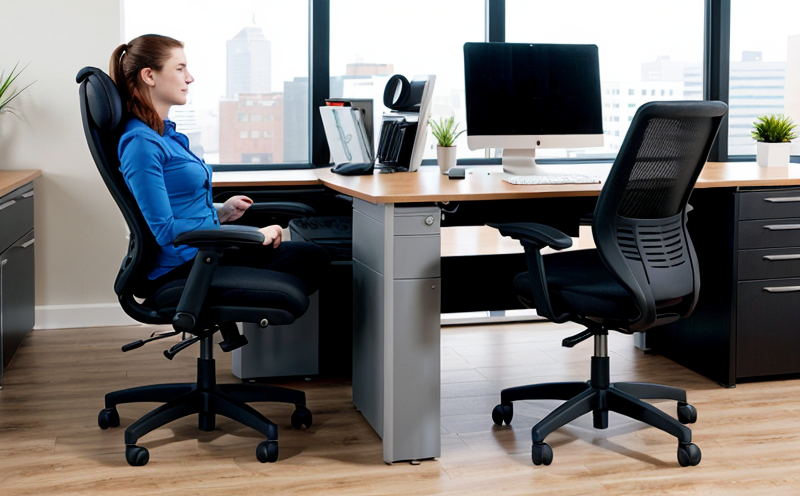ISO 16000-9 Indoor Air Emission Testing of Office Furniture Materials
The ISO 16000 series is a comprehensive set of international standards designed to improve indoor air quality. Among these, ISO 16000-9:2015 specifically addresses the determination of volatile organic compounds (VOCs) and other chemicals that may be emitted from various materials used in office furniture.
The testing procedure outlined in ISO 16000-9 is crucial for ensuring compliance with international indoor air quality guidelines. This service helps manufacturers, suppliers, and purchasers verify that their products do not release harmful VOCs into the environment. The test method involves placing a representative sample of the office furniture material inside a chamber where it is subjected to controlled temperature and humidity conditions. Over time, any emissions are collected and analyzed using gas chromatography or other appropriate analytical techniques.
The significance of this testing extends beyond mere compliance; it plays a pivotal role in safeguarding public health by reducing exposure to potentially hazardous substances. For instance, formaldehyde, which is often found in adhesives used for particleboard, can have adverse effects on human health if present at high levels. By adhering to ISO 16000-9 standards, manufacturers contribute significantly towards creating healthier indoor environments.
Our laboratory utilizes state-of-the-art equipment and experienced technicians who ensure accurate and reliable results. We offer full-service solutions including specimen preparation, testing execution, data analysis, and comprehensive reporting tailored specifically for your needs. Our team works closely with clients from various industries such as furniture manufacturing to provide them with actionable insights that help improve product quality while meeting regulatory requirements.
Understanding the importance of indoor air quality is essential not only in offices but also in homes and other enclosed spaces where people spend significant time indoors. By participating in ISO 16000-9 testing, businesses demonstrate their commitment to maintaining safe working conditions for employees and clients alike. This proactive approach can enhance brand reputation and foster trust within the marketplace.
Compliance with international standards like ISO 16000-9 also offers numerous benefits beyond just meeting legal requirements. It enhances a company's competitive position by setting higher quality benchmarks than those mandated by law. Moreover, demonstrating adherence to these rigorous testing protocols can attract more customers who prioritize health and safety above all else.
In conclusion, ISO 16000-9 indoor air emission testing of office furniture materials is an indispensable tool for any business involved in this sector. By leveraging our expertise and advanced facilities, we provide clients with peace of mind knowing their products meet the highest standards of quality and safety.
Applied Standards
The ISO 16000 series includes several subparts addressing different aspects of indoor air quality. Among them, ISO 16000-9:2015 focuses specifically on the determination of volatile organic compounds (VOCs) and other chemicals that might be emitted from materials used in office furniture.
In addition to ISO standards, our laboratory also adheres to other relevant international guidelines such as ASTM D6007 for testing indoor air quality associated with wood products. These additional references ensure comprehensive coverage when assessing the environmental impact of different materials commonly found in office settings.
By incorporating multiple standard protocols into our testing procedures, we guarantee that every aspect affecting indoor air quality is thoroughly examined. This holistic approach ensures accuracy and consistency across all tests performed by our laboratory.
Quality and Reliability Assurance
At [Lab Name], ensuring the highest level of quality and reliability in our testing services is paramount. We achieve this through rigorous adherence to international standards, continuous improvement processes, and stringent internal controls.
Our commitment to excellence starts with selecting appropriate specimen materials representative of those used in actual office furniture production lines. Specimens are prepared according to detailed specifications provided by ISO 16000-9:2015 ensuring consistency between samples analyzed during different testing sessions.
The use of advanced instrumentation such as gas chromatographs guarantees accurate detection and quantification of all relevant compounds emitted from tested materials. Our analysts possess extensive experience working with these sophisticated tools allowing them to interpret complex data sets confidently.
Data analysis follows strict protocols designed to minimize error margins and provide reliable results. All findings are cross-checked multiple times before final reports are generated ensuring accuracy beyond doubt. These detailed reports include recommendations for improvement based on test outcomes helping manufacturers address potential issues proactively.
Our quality assurance measures extend beyond laboratory operations into every phase of the testing process including procurement, handling, and storage of specimens. This comprehensive approach ensures that all factors affecting test results are controlled meticulously leading to trustworthy findings.
Competitive Advantage and Market Impact
Participating in ISO 16000-9 indoor air emission testing of office furniture materials offers significant competitive advantages. Firstly, it demonstrates a company's dedication to maintaining the highest standards of quality and safety which can significantly enhance its reputation among consumers who prioritize health and well-being.
Moreover, compliance with such stringent testing protocols provides an edge over competitors who may not meet these requirements. Potential buyers often prefer brands that go above and beyond regulatory obligations showing they are committed to creating healthier environments for end-users.
The results from ISO 16000-9 tests can also serve as a marketing tool attracting new customers looking for environmentally friendly products. Many consumers today seek out businesses offering sustainable practices; showcasing compliance with international standards like these helps build positive associations between the brand and eco-conscious consumer groups.
From an operational perspective, participating in ISO 16000-9 testing allows companies to identify potential issues early on giving them time to rectify problems before they become major concerns. This proactive approach not only prevents costly recalls but also ensures continued satisfaction from satisfied customers who trust the products offered by compliant firms.
Finally, integrating such rigorous testing into one's business strategy can lead to long-term growth opportunities as markets increasingly demand safer and healthier indoor environments. By staying ahead of trends and adopting best practices early on, companies position themselves favorably for future successes in this rapidly evolving industry landscape.





